Module 1 Unit 2 Are they yours?课件(共44张PPT)
文档属性
| 名称 | Module 1 Unit 2 Are they yours?课件(共44张PPT) | 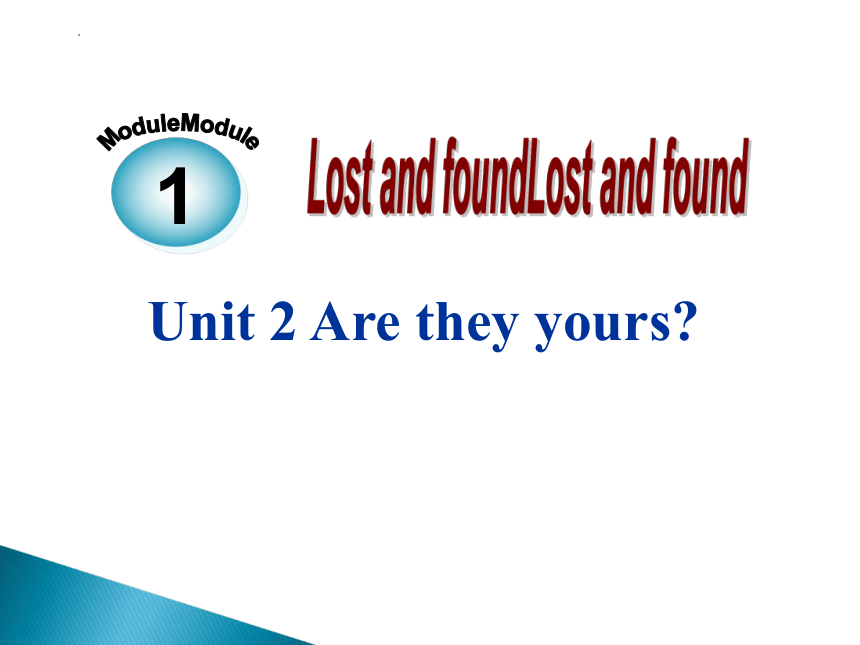 | |
| 格式 | pptx | ||
| 文件大小 | 6.0MB | ||
| 资源类型 | 教案 | ||
| 版本资源 | 外研版 | ||
| 科目 | 英语 | ||
| 更新时间 | 2022-05-25 09:20:55 | ||
图片预览


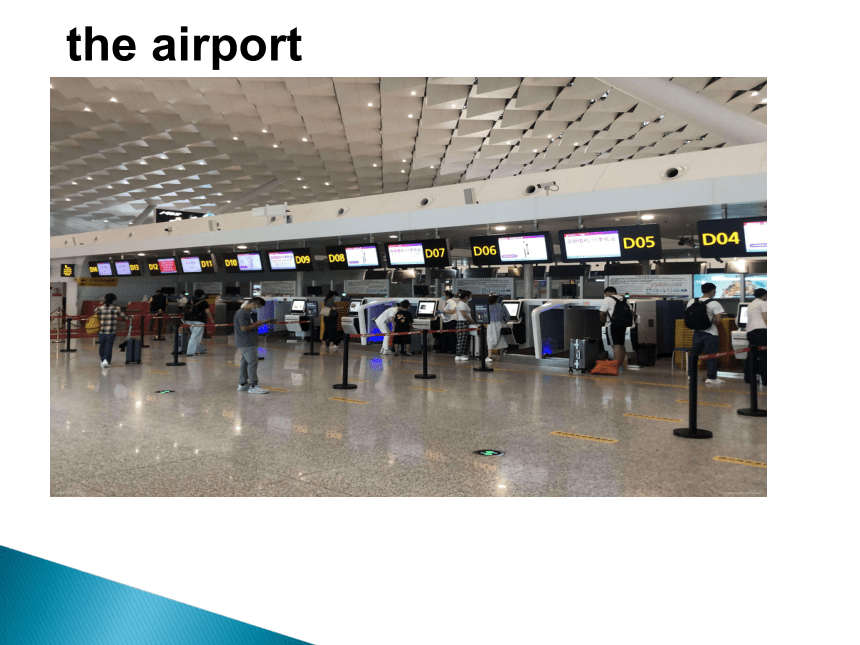


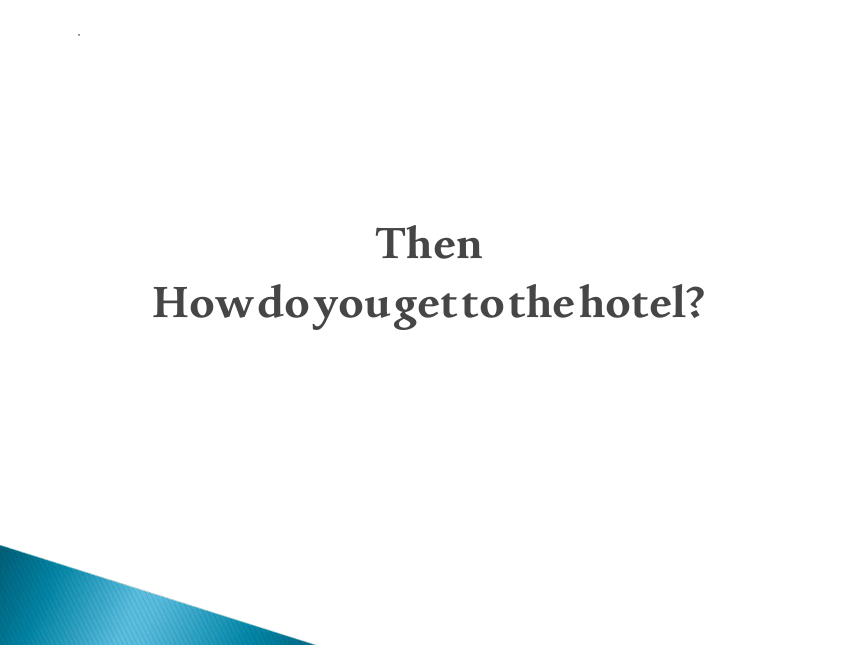
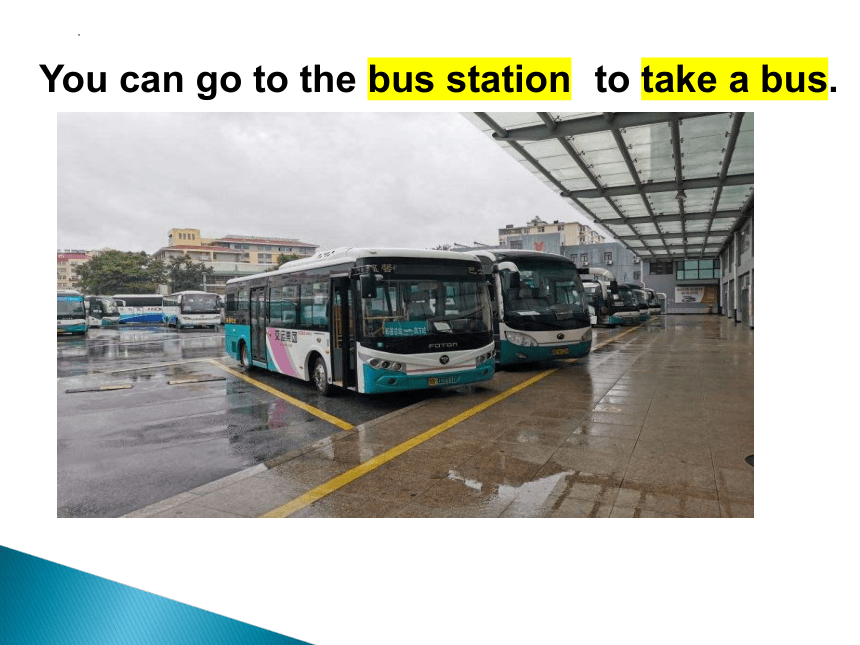


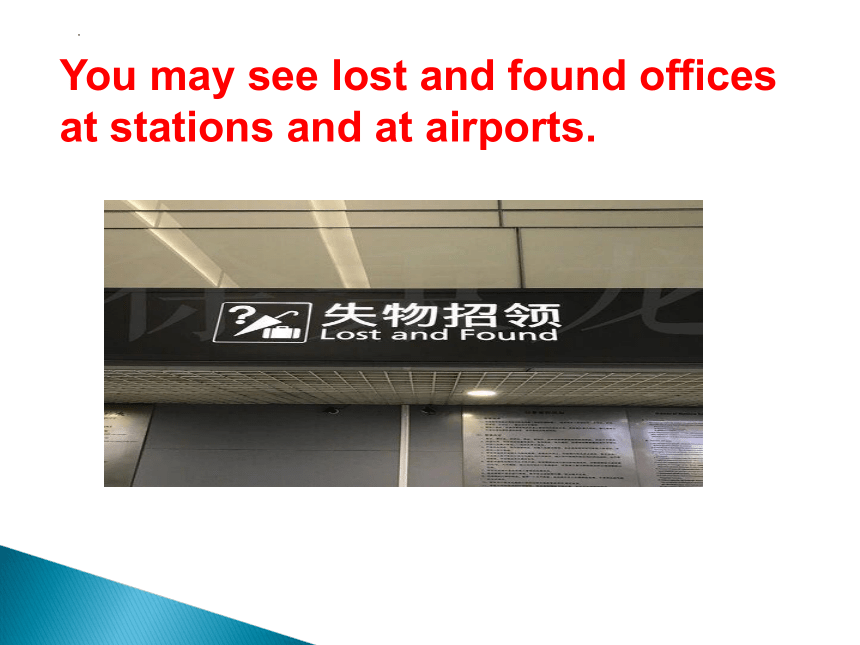
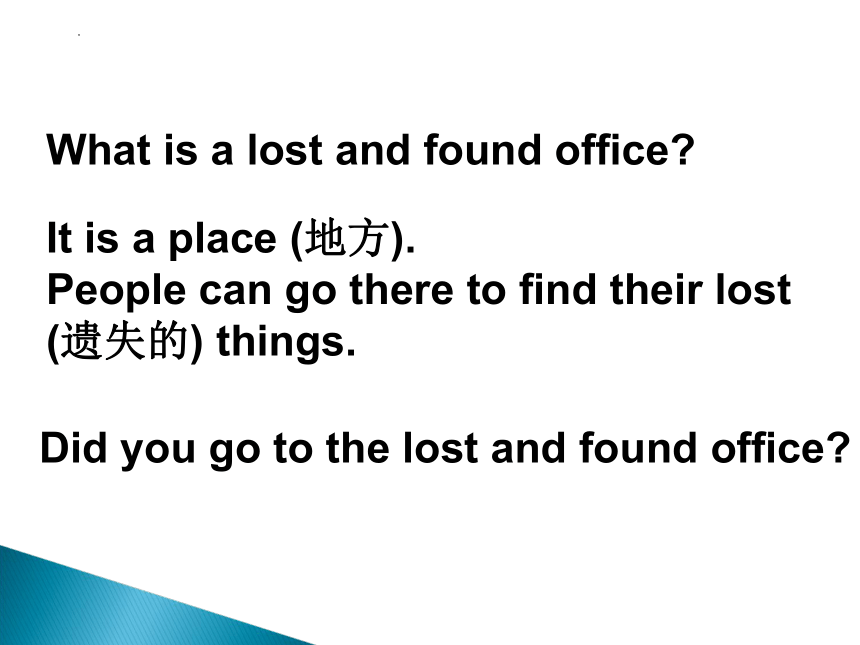
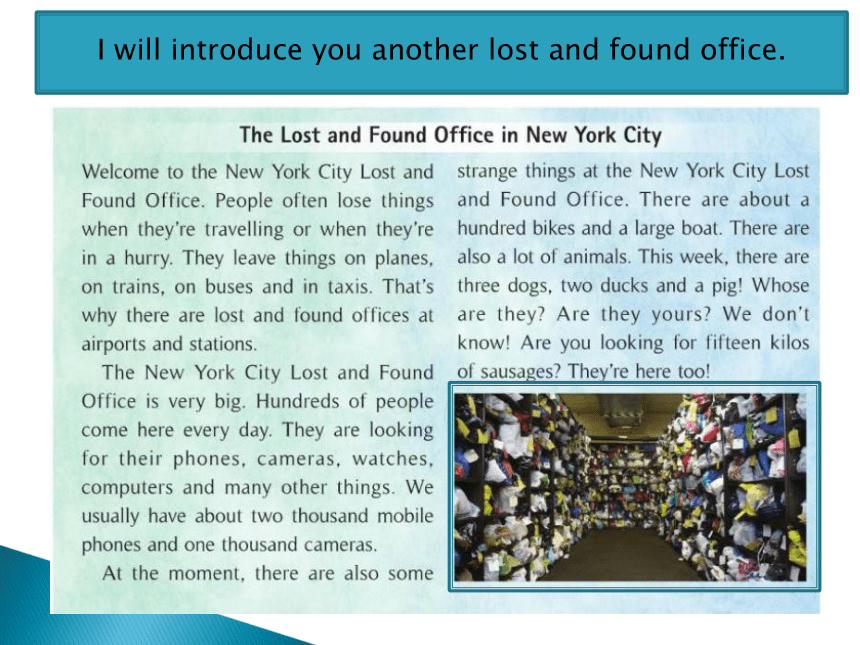
文档简介
(共44张PPT)
1
Lost and foundLost and found
ModuleModule
Unit 2 Are they yours
If(如果) you are going to go to Beijing,
how do you get there
Free Talk
the airport
to take planes at the airport
You can go to the train station to take a train.
Trains are very convinient(方便的).
Then
How do you get to the hotel
You can go to the bus station
to take a bus.
You can see many people get on and get off the buses at the bus station.
Or you can take a taxi to get there.
You may see lost and found offices at stations and at airports.
What is a lost and found office
Did you go to the lost and found office
It is a place (地方).
People can go there to find their lost (遗失的) things.
I will introduce you another lost and found office.
Read and answer following questions
1.Where is the lost and found office
2.Why there are lost and found offices at airports and stations
3. When do people often lose things
4.What’s the meaning of the word “leave” in paragraph 1
5.What do people do at the lost and found office (Para.2)
6.What strange things are there at the New York Lost and Found Office
Read and check your answer
2.Why are there lost and found offices at airports and stations (Para.1)
Because they leave things on planes , on trains, on buses and in taxis.
Read and answer following questions
3.What’s the meaning of the word “leave” in paragraph 1 ( )
A. 离开 B. 记住 C.遗忘 D.发现
C
Read and answer following questions
3.When do people often lose things (Para.1)
When they're travelling or when they're in a hurry.
Tips: 根据题干寻找关键信息
Read and answer following questions
4.What’s the meaning of the word “leave” in paragraph 1 ( )
A. 离开 B. 记住 C.遗忘 D.发现
C
5. What do people do at the lost and found office (Para.2)
People look for their phones,cameras,watches, computers and many other things.
watch
camera
phone
mobile phone
Read and answer following questions
6. What strange(奇异的) things are there at the New York Lost and Found Office
A large boat, three dogs, two ducks, a pig and
fifteen kilos of sausages.
boat
sausages
duck
How many people come to the Lost and Found Office in New York City ( )
A. Two hundre
B. Two thousand
C. Hundreds of
D. Thousands of
C
Why dose the writer write the passage ( )
A.To tell people to be careful in the life.
B. To introduce (介绍) the Lost and Found Office in New York City.
C. To ask people to visit the Lost and Found Office in New York City.
D. To make people belive (使相信) the Lost and Found Office in New York City is strange.
B
Where is it
When do people go there
Why is it there
What do people do there
What strange things are there
( )1. There are a lot of lost and found
websites online.
( )2. You can buy dogs and cats at www.
.
( )3. Maybe you can find your favourite
things at www. foundbin. com.
( )4. The Internet lost and found websites can help you find your lost things.
Page 7: Around the world
True (T) or False (F)
T
F
find
F
lost
T
网站 n.
help somebody (to) do something
1. A man is getting on a bus.
Language pointsLanguage points
get on 上(车、船、飞机等)
e.g.:
The children are getting on the bus one by one.
孩子们正在一个接一个地上公共汽车。
I took the subway and _______ at the downtown station.
A. got through B. got over C.got on D.got off
get off 下(车、船、飞机等)
get into 上(小汽车)
get out of 下(小汽车)
D
2. People often lose things when they’re travelling or when they’re in a hurry. 人们在旅行中或匆忙时常丢东西。
in a hurry的意思是“匆匆忙忙地”,是一个介词短语
hurry做动词:hurry up:“赶快,赶紧”
hurry 做名词:“(there’s) no hurry”,意思是“不忙,不必着急,有充裕时间……”。
e.g.:
We must hurry up if we want to be there on time.
如果想准时到那里的话,我们就必须动作快点。
There is no hurry, so do it slowly and carefully.
不必赶时间,要慢慢地,认真地完成任务。
hurry to do something 匆忙做某事
Tom,wash your face in a hurry! Hurry up! You are going to be late. You must hurry to school! But don’t hurry to cross the road!
3. They leave things on planes, on trains, on buses and in taxis.
(1) leave: v. 丢下;遗忘. 其过去式为left
leave something + 地点状语: 把某物遗落在......
eg.
I left my umbrella (雨伞) at home.
我把雨伞忘在家里了。
(2) leave + 地点:离开某地
I will leave Shanghai.
我将要离开上海。
(3) leave for +地点:动身去某地
My father is leaving for Shanghai tomorrow.
我爸爸明天要动身去上海。
(4) leave 地点A for 地点B :离开A地去B地
She will leave Beijing for Shanghai.
与forget的区别
forget表示“遗忘某物”,常指头脑中记不起某物了
4. That’s why there are lost and found offices at airports and stations.
That’s why + 句子:这/那就是为什么......;这/那就是......的原因。
Tom is hard-working and helpful.
That’s why we should learn from him.
汤姆勤奋学习而且乐于助人。
这就是我们应该向他学习的原因。
5. strange adj. 奇怪的
stranger n. 陌生人
On my way to school, a strange man followed (跟随) me. He was strange. I ran away quickly. My mother often tells me not to speak to strangers.
在我上学的路上,一个陌生的男人跟着我。他很奇怪。我迅速地跑开了。我的妈妈不让我跟陌生人说话。
6. Hundreds of people come here every day.
每天都有很多人来这里。
hundreds of 表示“好几百,许许多多”, 相当于 lots of,是一个概数, 后面跟着的名词和hundred都要用复数形式
而 hundred 这个词本身是一个确数,表示“一百”。当hundred之前有一个确切的基数词修饰的时候, 它要使用单数形式。
e.g.:
two hundred students 两百个学生
hundreds of teachers 好几百个老师
辨析 every day 和 everyday
every day 是副词词组,在句子中做状语,表示频率“每天,天天”。
e.g.: We speak English every day.
everyday是形容词,在句子中只做定语,表示“日常的,每天的”。
e.g.: Let’s learn some everyday English.
辨析:look for与find
1、look for意为“寻找”,指有目的的找,强调“寻找”这一动作。
2、find意为“找到;发现”,强调“找”的结果,其宾语往往是某个丢失的东西或人。
What are you looking for 你在找什么?
I’m looking for my bike.我在找我的自行车。
I’m looking for my bag, but I can’t find it.
我找我的书包,但我没找到。
辨析:talk,speak,tell与say
1、talk意为“谈话;讲话”,如果只有一方对另一方说话时,一般用talk to,如果双方或多方交谈时,多用talk with。
2、speak意为“说话;讲话”,后面常接语言。
speak to 意为“和… …谈话、讲话”
3、tell意为“告诉;讲述”
4、say 意为“说”,后常跟说话内容。
tell sb. sth. 告知某人某事
tell sb. to do sth.告诉某人去做某事
tell sb. not to do sth. 告诉某人不要做某事
My mother tells me not to talk to stragers.
堂堂清:课文原文重现:
1.人们经常丢东西当他们在旅行或当他们匆匆忙忙的时候。
2.他们把东西忘在飞机上,火车上,公交车上以及出租车上。
3.他们正在寻找他们的手机、相机、手表、电脑已及许多其它的东西。
4.有大约100辆自行车和一艘大船。
People often lose things when they're travelling or when they 're in a hurry.
They leave things on planes,on trains, on buses and in taxis.
They are looking for their phones, cameras, watches, computers and many other things.
There are about a hundred bikes and a large boat.
Careful phrases:
1、欢迎到......
2、丢东西
3、匆匆忙忙
4、把某物遗忘在某地
5、失物招领处
6、在飞机场
7、成百上千的......
8、寻找
9、许多其他的东西
10、2000块手机
11、此刻
12、奇怪的东西
13、15公斤香肠
welcome to...
lose things
in a hurry
leave sth +介短
lost and found offices
at airports
hundreds of
look for
many other things
two thousand mobile phones
at the moment
strange things
fifteen kilos of sausages
People in a hurry often (1) ____________ things, and there are (2) ____________ things at lost and found offices at (3) ____________ and (4) ____________. At the New York City and Found Office, there are also some very (5) ____________ things. There are fifteen kilos of (6) ____________
-- are they yours And how do you lose a (7) ____________ boat on a train
Complete the passage with the correct form.
airport hundreds of large lose
sausage station strange
lose
hundreds of
airports
station
strange
sausage
large
Did you lose(遗失) things on planes, on buses, on trains or in taxis
What did you lose
Lost
A blue wallet.
At school.
Call Lingling at XXX.
A Possible Version
Found
Is this your redbag
Found at the station.
Call Li at XXX.
What does it look like
What did you lose
Where did you lose it
How to contact (联系v.) you
补充词语
Describing (描述) things:
What shape(形状) is it
triangular( ), square ( ),
rectangular( ), rhombus( ),
taper( ), circular( )
What size(尺寸) is it
big, small, tiny, medium
long, short
补充词语
What color is it
pink, sliver(银), golden(金), light blue(浅兰), dark red (深红),sandy(砂黄), ginger(姜黄)
What is it made of
It is made of...
cloth (布), canvas(帆布),wood (木),
steel (钢), iron (铁), nylon (尼龙),
glass (玻璃), plastic (塑料),
leather (皮), rubber (橡胶)
Lost
A white and circular wireless earphone.
It is made of plastic.
At the train station.
Call Grace at XXX.
Rewrite the sentencesRewrite the sentences
That is his schoolbag.
______________________.
These are her babies.
__________________________.
This is Lily’s skirt.
___________________________.
This shirt is Lily’s.
These babies are hers.
That schoolbag is his.
1. Is this your eraser
________________
2. It’s not mine.
________________
3. Are these your boxes
___________________
4. They are not mine.
___________________
Is this eraser yours
It’s not my eraser.
Are these boxes yours?
They are not my boxes.
句型转换:句型转换:
1. 大部分形容词性物主代词在后面加 “s”构成名词
性物主代词.有3个特殊情况:
my—mine, his— his, its—its。
2. 形容词性物主代词与名词性物主代词的区别:
前者有名词的含义,后面需跟名词;后者可单独使用,相当于对应的形容词性物主代词加名词。
3. 名词性物主代词作主语时,如果含义是单数,后面的be动词用is;如果含义是复数,那么be动词用are。
SummarySummary
堂堂清
二.用所给词的适当形式填空
1. That is not _________ kite. That kite is very small, but _________ is very big. ( I )
2. The dress is ________. Give it to _____. ( she )
3. Is this ______ watch (you) No, it’s not _____ . ( I )
4. _____ is my brother. ______ name is Jack. Look! Those stamps are ______. ( he )
5. ______ dresses are red. (we) What colour are ______ ( you )
6. Here are many dolls, which one is ______ ( she )
my
mine
hers
her
your
mine
He
His
his
Our
yours
hers
Thank you!Thank you!
1
Lost and foundLost and found
ModuleModule
Unit 2 Are they yours
If(如果) you are going to go to Beijing,
how do you get there
Free Talk
the airport
to take planes at the airport
You can go to the train station to take a train.
Trains are very convinient(方便的).
Then
How do you get to the hotel
You can go to the bus station
to take a bus.
You can see many people get on and get off the buses at the bus station.
Or you can take a taxi to get there.
You may see lost and found offices at stations and at airports.
What is a lost and found office
Did you go to the lost and found office
It is a place (地方).
People can go there to find their lost (遗失的) things.
I will introduce you another lost and found office.
Read and answer following questions
1.Where is the lost and found office
2.Why there are lost and found offices at airports and stations
3. When do people often lose things
4.What’s the meaning of the word “leave” in paragraph 1
5.What do people do at the lost and found office (Para.2)
6.What strange things are there at the New York Lost and Found Office
Read and check your answer
2.Why are there lost and found offices at airports and stations (Para.1)
Because they leave things on planes , on trains, on buses and in taxis.
Read and answer following questions
3.What’s the meaning of the word “leave” in paragraph 1 ( )
A. 离开 B. 记住 C.遗忘 D.发现
C
Read and answer following questions
3.When do people often lose things (Para.1)
When they're travelling or when they're in a hurry.
Tips: 根据题干寻找关键信息
Read and answer following questions
4.What’s the meaning of the word “leave” in paragraph 1 ( )
A. 离开 B. 记住 C.遗忘 D.发现
C
5. What do people do at the lost and found office (Para.2)
People look for their phones,cameras,watches, computers and many other things.
watch
camera
phone
mobile phone
Read and answer following questions
6. What strange(奇异的) things are there at the New York Lost and Found Office
A large boat, three dogs, two ducks, a pig and
fifteen kilos of sausages.
boat
sausages
duck
How many people come to the Lost and Found Office in New York City ( )
A. Two hundre
B. Two thousand
C. Hundreds of
D. Thousands of
C
Why dose the writer write the passage ( )
A.To tell people to be careful in the life.
B. To introduce (介绍) the Lost and Found Office in New York City.
C. To ask people to visit the Lost and Found Office in New York City.
D. To make people belive (使相信) the Lost and Found Office in New York City is strange.
B
Where is it
When do people go there
Why is it there
What do people do there
What strange things are there
( )1. There are a lot of lost and found
websites online.
( )2. You can buy dogs and cats at www.
.
( )3. Maybe you can find your favourite
things at www. foundbin. com.
( )4. The Internet lost and found websites can help you find your lost things.
Page 7: Around the world
True (T) or False (F)
T
F
find
F
lost
T
网站 n.
help somebody (to) do something
1. A man is getting on a bus.
Language pointsLanguage points
get on 上(车、船、飞机等)
e.g.:
The children are getting on the bus one by one.
孩子们正在一个接一个地上公共汽车。
I took the subway and _______ at the downtown station.
A. got through B. got over C.got on D.got off
get off 下(车、船、飞机等)
get into 上(小汽车)
get out of 下(小汽车)
D
2. People often lose things when they’re travelling or when they’re in a hurry. 人们在旅行中或匆忙时常丢东西。
in a hurry的意思是“匆匆忙忙地”,是一个介词短语
hurry做动词:hurry up:“赶快,赶紧”
hurry 做名词:“(there’s) no hurry”,意思是“不忙,不必着急,有充裕时间……”。
e.g.:
We must hurry up if we want to be there on time.
如果想准时到那里的话,我们就必须动作快点。
There is no hurry, so do it slowly and carefully.
不必赶时间,要慢慢地,认真地完成任务。
hurry to do something 匆忙做某事
Tom,wash your face in a hurry! Hurry up! You are going to be late. You must hurry to school! But don’t hurry to cross the road!
3. They leave things on planes, on trains, on buses and in taxis.
(1) leave: v. 丢下;遗忘. 其过去式为left
leave something + 地点状语: 把某物遗落在......
eg.
I left my umbrella (雨伞) at home.
我把雨伞忘在家里了。
(2) leave + 地点:离开某地
I will leave Shanghai.
我将要离开上海。
(3) leave for +地点:动身去某地
My father is leaving for Shanghai tomorrow.
我爸爸明天要动身去上海。
(4) leave 地点A for 地点B :离开A地去B地
She will leave Beijing for Shanghai.
与forget的区别
forget表示“遗忘某物”,常指头脑中记不起某物了
4. That’s why there are lost and found offices at airports and stations.
That’s why + 句子:这/那就是为什么......;这/那就是......的原因。
Tom is hard-working and helpful.
That’s why we should learn from him.
汤姆勤奋学习而且乐于助人。
这就是我们应该向他学习的原因。
5. strange adj. 奇怪的
stranger n. 陌生人
On my way to school, a strange man followed (跟随) me. He was strange. I ran away quickly. My mother often tells me not to speak to strangers.
在我上学的路上,一个陌生的男人跟着我。他很奇怪。我迅速地跑开了。我的妈妈不让我跟陌生人说话。
6. Hundreds of people come here every day.
每天都有很多人来这里。
hundreds of 表示“好几百,许许多多”, 相当于 lots of,是一个概数, 后面跟着的名词和hundred都要用复数形式
而 hundred 这个词本身是一个确数,表示“一百”。当hundred之前有一个确切的基数词修饰的时候, 它要使用单数形式。
e.g.:
two hundred students 两百个学生
hundreds of teachers 好几百个老师
辨析 every day 和 everyday
every day 是副词词组,在句子中做状语,表示频率“每天,天天”。
e.g.: We speak English every day.
everyday是形容词,在句子中只做定语,表示“日常的,每天的”。
e.g.: Let’s learn some everyday English.
辨析:look for与find
1、look for意为“寻找”,指有目的的找,强调“寻找”这一动作。
2、find意为“找到;发现”,强调“找”的结果,其宾语往往是某个丢失的东西或人。
What are you looking for 你在找什么?
I’m looking for my bike.我在找我的自行车。
I’m looking for my bag, but I can’t find it.
我找我的书包,但我没找到。
辨析:talk,speak,tell与say
1、talk意为“谈话;讲话”,如果只有一方对另一方说话时,一般用talk to,如果双方或多方交谈时,多用talk with。
2、speak意为“说话;讲话”,后面常接语言。
speak to 意为“和… …谈话、讲话”
3、tell意为“告诉;讲述”
4、say 意为“说”,后常跟说话内容。
tell sb. sth. 告知某人某事
tell sb. to do sth.告诉某人去做某事
tell sb. not to do sth. 告诉某人不要做某事
My mother tells me not to talk to stragers.
堂堂清:课文原文重现:
1.人们经常丢东西当他们在旅行或当他们匆匆忙忙的时候。
2.他们把东西忘在飞机上,火车上,公交车上以及出租车上。
3.他们正在寻找他们的手机、相机、手表、电脑已及许多其它的东西。
4.有大约100辆自行车和一艘大船。
People often lose things when they're travelling or when they 're in a hurry.
They leave things on planes,on trains, on buses and in taxis.
They are looking for their phones, cameras, watches, computers and many other things.
There are about a hundred bikes and a large boat.
Careful phrases:
1、欢迎到......
2、丢东西
3、匆匆忙忙
4、把某物遗忘在某地
5、失物招领处
6、在飞机场
7、成百上千的......
8、寻找
9、许多其他的东西
10、2000块手机
11、此刻
12、奇怪的东西
13、15公斤香肠
welcome to...
lose things
in a hurry
leave sth +介短
lost and found offices
at airports
hundreds of
look for
many other things
two thousand mobile phones
at the moment
strange things
fifteen kilos of sausages
People in a hurry often (1) ____________ things, and there are (2) ____________ things at lost and found offices at (3) ____________ and (4) ____________. At the New York City and Found Office, there are also some very (5) ____________ things. There are fifteen kilos of (6) ____________
-- are they yours And how do you lose a (7) ____________ boat on a train
Complete the passage with the correct form.
airport hundreds of large lose
sausage station strange
lose
hundreds of
airports
station
strange
sausage
large
Did you lose(遗失) things on planes, on buses, on trains or in taxis
What did you lose
Lost
A blue wallet.
At school.
Call Lingling at XXX.
A Possible Version
Found
Is this your redbag
Found at the station.
Call Li at XXX.
What does it look like
What did you lose
Where did you lose it
How to contact (联系v.) you
补充词语
Describing (描述) things:
What shape(形状) is it
triangular( ), square ( ),
rectangular( ), rhombus( ),
taper( ), circular( )
What size(尺寸) is it
big, small, tiny, medium
long, short
补充词语
What color is it
pink, sliver(银), golden(金), light blue(浅兰), dark red (深红),sandy(砂黄), ginger(姜黄)
What is it made of
It is made of...
cloth (布), canvas(帆布),wood (木),
steel (钢), iron (铁), nylon (尼龙),
glass (玻璃), plastic (塑料),
leather (皮), rubber (橡胶)
Lost
A white and circular wireless earphone.
It is made of plastic.
At the train station.
Call Grace at XXX.
Rewrite the sentencesRewrite the sentences
That is his schoolbag.
______________________.
These are her babies.
__________________________.
This is Lily’s skirt.
___________________________.
This shirt is Lily’s.
These babies are hers.
That schoolbag is his.
1. Is this your eraser
________________
2. It’s not mine.
________________
3. Are these your boxes
___________________
4. They are not mine.
___________________
Is this eraser yours
It’s not my eraser.
Are these boxes yours?
They are not my boxes.
句型转换:句型转换:
1. 大部分形容词性物主代词在后面加 “s”构成名词
性物主代词.有3个特殊情况:
my—mine, his— his, its—its。
2. 形容词性物主代词与名词性物主代词的区别:
前者有名词的含义,后面需跟名词;后者可单独使用,相当于对应的形容词性物主代词加名词。
3. 名词性物主代词作主语时,如果含义是单数,后面的be动词用is;如果含义是复数,那么be动词用are。
SummarySummary
堂堂清
二.用所给词的适当形式填空
1. That is not _________ kite. That kite is very small, but _________ is very big. ( I )
2. The dress is ________. Give it to _____. ( she )
3. Is this ______ watch (you) No, it’s not _____ . ( I )
4. _____ is my brother. ______ name is Jack. Look! Those stamps are ______. ( he )
5. ______ dresses are red. (we) What colour are ______ ( you )
6. Here are many dolls, which one is ______ ( she )
my
mine
hers
her
your
mine
He
His
his
Our
yours
hers
Thank you!Thank you!
同课章节目录
- Module 1 Lost and found
- Unit 1 Whose bag is this?
- Unit 2 Are they yours?
- Unit 3 Language in use
- Module 2 What can you do ?
- Unit 1 I can play the piano
- Unit 2 I can run really fast
- Unit 3 Language in use
- Module 3 Making plans
- Unit 1 What are you going to do at the weekends?
- Unit 2 We're going to cheer the players.
- Unit 3 Language in use
- Module 4 Life in the future
- Unit 1 Everyone will study at home
- Unit 2 Every family will have a small plane.
- Unit 3 Language in use
- Module 5 Shopping
- Unit 1 What can I do for you?
- Unit 2 You can buy everything on the Internet
- Unit 3 Language in use
- Module 6 Around town
- Unit 1 Could you tell me how to get to the Nationa
- Unit 2 The London Eye is on your right.
- Unit 3 Language in use
- Revision module A
- Module 7 My past life
- Unit 1 I was born in a small village.
- Unit 2 I was born in Quincy.
- Unit 3 Language in use
- Module 8 Story time
- Unit 1 Once upon a time….
- Unit 2 Goldilocks hurried out of the house.
- Unit 3 Language in use
- Module 9 Life history
- Unit 1 He left school and began work at the age of
- Unit 2 He decided to be an actor.
- Unit 3 Language in use
- Module 10 A holiday journey
- Unit 1 What did you do?
- Unit 2 This morning we took a walk.
- Unit 3 Language in use
- Module 11 Body language
- Unit 1 They touch noses!
- Unit 2 Here are some ways to welcome them.
- Unit 3 Language in use
- Module 12 Western music
- Unit 1 It's so beautiful!
- Unit 2 Vienna is the centre of European classical
- Unit 3 Language in use
- Revision module B
